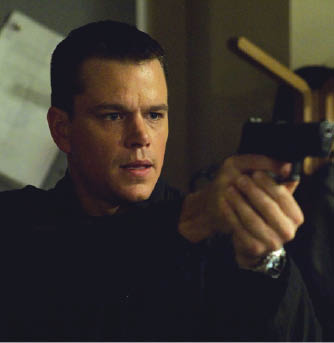Bourne in the USA: The Bourne Ultimatum
by M. Faust

It wasn’t until some time after I saw The Bourne Ultimatum, the third film in the series about the amnesiac spy Jason Bourne, that it occurred to me to think about what the film was lacking. As the presumed end of a trilogy—while there’s no reason why the series can’t be continued, the mystery of Bourne’s past is revealed—the conclusion lacks the punch it seems to think it has, the punch we might have felt had we been brought more deeply into the character.
That’s as may be. But the Bourne films aren’t based on John Le Carre novels, they’re adapted (however loosely) from potboilers by Robert Ludlum, who I suspect would have considered the word “efficient” the highest praise that could be awarded him. Like its predecessors, The Bourne Ultimatum may not be very deep stuff. But what it is good at, it does very well indeed.
You don’t need to have seen the previous installments in the series to pick up the thread here. Or, if you’re like me, you can pretty much have forgotten them five minutes after you saw them and still not be lost. Of course, those of you—the majority, I suspect—who remember The Bourne Identity and The Bourne Supremacy in any detail will probably have a greater appreciation for it (not to mention the answers to niggling questions like, where does Bourne get the cash to be able to buy these cell phones that he only uses for half an hour?).
Ultimatum opens with Bourne (Matt Damon) still in Europe, working to uncover the clandestine CIA operation that made him an unstoppable killing machine but destroyed his memory—the same people who later murdered his lover. His search catches the attention of government operatives in the US, who use every surveillance tool at their disposal to monitor him, hoping to uncover and silence his leads before they can help him any further.
Working out of headquarters in Manhattan, the CIA surveillance operation is a paranoid’s nightmare, with the instantaneous ability to watch and direct actions in any part of the world. In a scene that must have been a logistical nightmare to film, Bourne tries to connect with a callow British reporter (Paddy Considine) in London’s perpetually crowded Waterloo Station, where an intricate operation has been set up to observe and kill them.
It’s an exciting scene not simply because we’re rooting for Bourne to outwit the spooks (it’s only 30 minutes into the film—of course he’s going to succeed), but because we’re fascinated by the seemingly omniscient and omnipotent capabilities of the government agents, whose side of the contest we are equally privy to.
Heading the CIA operation in New York are the splendidly matched Joan Allen and David Strathairn as CIA executives with different perspectives: She has some sympathy for Bourne, he just wants to kill him as quickly as possible before Bourne can uncover the rogue operation he used to head. Having them together is a bit of a casting coup: They’re two of the best actors gracing American movies these days, and they don’t treat their roles here with any amount of condescension—it’s great fun watching them stew at each other, trying to keep their mutual professional dislike under wraps. The venerable Albert Finny is also on hand as a company doctor with the final clue to Bourne’s identity crisis.
Filmed on location in Moscow, Paris, Madrid, London and Tangier (the last used to especially good advantage for a pair of exciting chases), The Bourne Ultimatum was directed by Paul Greenglass, the British filmmaker who cut his teeth on documentaries in the 1990s. (He also directed The Bourne Supremacy, a marked improvement over Doug Liman’s original Bourne Identity). This style of action filmmaking, with its volatile handheld cameras and rat-a-tat-tat editing, usually simply creates confusion, but Greenglass is actually quite good at it: He manages what looks like chaos to increase our involvement and tension. (His last film was United 93, a movie that might well have been unwatchable in other hands.) Credit is also due to the propulsive, percussion-heavy score by John Powell.
I wouldn’t want to scare anyone away from seeing The Bourne Ultimatum by calling it a “thinking man’s thriller,” a phrase you would only use to distinguish it in a summer filled with movies that seem to actively discourage thinking. I don’t know why Hollywood doesn’t make movies like this all the time: Watching this, I’m just heartened to know that they still can.
|
Issue Navigation> Issue Index > v6n31: Fall from Grace (8/2/07) > Film Reviews > Bourne in the USA: The Bourne Ultimatum This Week's Issue • Artvoice Daily • Artvoice TV • Events Calendar • Classifieds |









 Current Issue
Current Issue